Unit 12 Don’t eat in class.学案第四节
新人教版英语七下《Unit 12 Don’t eat in class》word学案
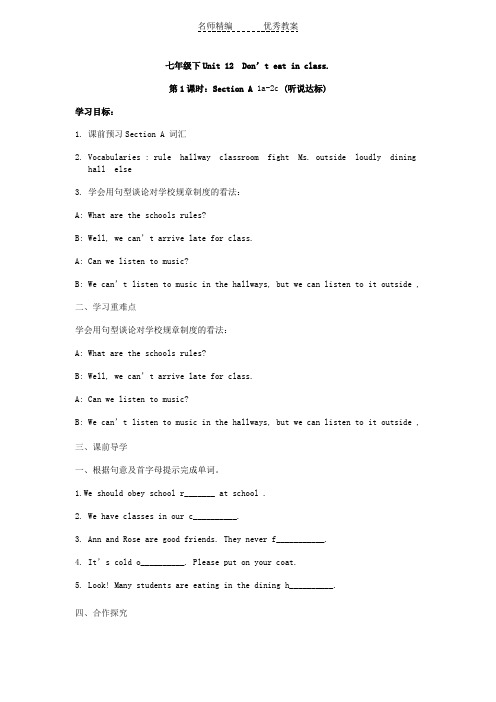
七年级下Unit 12 Don’t eat in class.第1课时:Section A 1a-2c (听说达标)学习目标:1. 课前预习Section A 词汇2. Vocabularies : rule hallway classroom fight Ms. outside loudly dininghall else3. 学会用句型谈论对学校规章制度的看法:A: What are the schools rules?B: Well, we can’t arriv e late for class.A: Can we listen to music?B: We can’t listen to music in the hallways, but we can listen to it outside ,二、学习重难点学会用句型谈论对学校规章制度的看法:A: What are the schools rules?B: Well, we can’t arrive late for class.A: Can we listen to music?B: We can’t listen to music in the hallways, but we can listen to it outside ,三、课前导学一、根据句意及首字母提示完成单词。
1.We should obey school r_______ at school .2. We have classes in our c__________.3. Ann and Rose are good friends. They never f___________.4. It’s cold o__________. Please put on your coat.5. Look! Many students are eating in the dining h__________.四、合作探究(听Section A 1b)一、听录音,这些学生违反了那些规定,请在学生的名字后填上序号。
人教版初中英语七年级下册Unit 12 Don’t eat in class教学设计说课稿
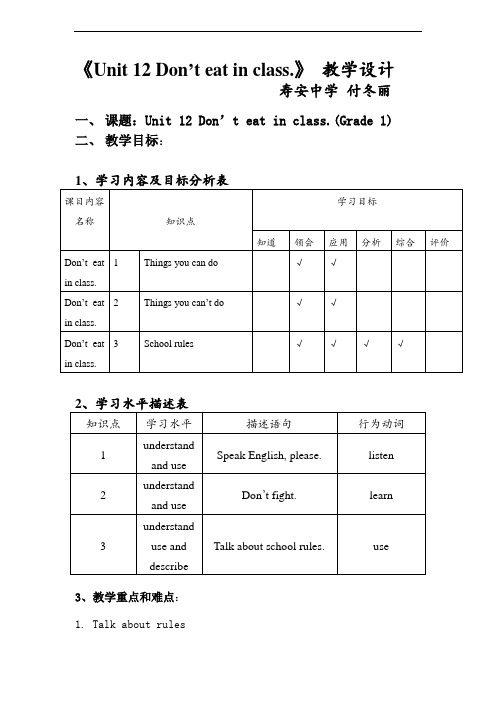
《Unit 12 Don’t eat in class.》教学设计寿安中学付冬丽一、课题:Unit 12 Don’t eat in class.(Grade 1)二、教学目标:3、教学重点和难点:1.Talk about rules2.Imperative sentences3.Express allowed4.Can express and describe rulesTask One:Talk about school rules to “feel” ImperativesGoal:Get to know about the structure to express rules Step 1: Talk about the school rules they know / remember Step 2: Look at the picture and read the rules in SectionA – 1a, telling the difference between yoursStep 3: Add more rules to your school, which you think necessaryTask Two:Learn to read the signs for rulesGoal: Learn about the rules by reading the signsDraw some signs on the blackboard and ask the students to describe them.Task Four:Write rules for libraries, labs, computer-rooms, andswimming pools etc.Goal: Learn to take care of public things7、板书设计New words:fight smoke hallway ruleSchool rules:DO1.Speak Chinese.2.Say “hello” to your teacher and classmates3.Finish homework after school.4.Wash clothes on time.DON’TS1.Don’t arrive late for class.2.Don’t run in the hallways.3.Don’t listen to music in the classroom or the hallways.4.Don’t fight.No fightingNo smokingNo talkingNo fishing8、教学流程图:Unit 12 Don’t eat in class.说课材料付冬丽课题:Unit 12 Don’t eat in class.(一)知识技能Get to know about the structure to express rules.Try to understand the rules.Learn to read the signs for rules.Learn to take care of public things.(二)情感态度价值观通过对学校规章制度的表述,培养学生遵守公共道德意识。
Unit 12 Don’t eat in class!教案

Unit 12 Don’t eat in class!教案(经典版)编制人:__________________审核人:__________________审批人:__________________编制单位:__________________编制时间:____年____月____日序言下载提示:该文档是本店铺精心编制而成的,希望大家下载后,能够帮助大家解决实际问题。
文档下载后可定制修改,请根据实际需要进行调整和使用,谢谢!并且,本店铺为大家提供各种类型的经典范文,如工作总结、工作计划、演讲致辞、策划方案、合同协议、规章制度、条据文书、诗词鉴赏、教学资料、其他范文等等,想了解不同范文格式和写法,敬请关注!Download tips: This document is carefully compiled by this editor. I hope that after you download it, it can help you solve practical problems. The document can be customized and modified after downloading, please adjust and use it according to actual needs, thank you!Moreover, our store provides various types of classic sample essays for everyone, such as work summaries, work plans, speeches, planning plans, contract agreements, rules and regulations, doctrinal documents, poetry appreciation, teaching materials, other sample essays, etc. If you want to learn about different sample formats and writing methods, please stay tuned!Unit 12 Don’t eat in class!教案Unit 12 Don’t eat in class!教案(精选2篇)Unit 12 Don’t eat in class!教案篇1unit 12 don’t eat in class!(一)重点句子1.don’t arrive late for class.2.don’t listen to music in the classrooms or the hallways.3.can we listen to music?4.do you have to wear a uniform at school?5.what else do you have to do ?6.don’t go out on school nights.7.practice your guitar every day .8.i have too many rules in my family.9.i can’t meet my friends after school because i have to do my homework.10.i have to be in bed by ten o’clock.11.i have to help my mom make dinner.(二)重点短语、词组及用法1.arrive 到达,抵达arrive at + 小地点 arrive at school 到达学校arrive in + 大地点 arrive in beijing 到达北京get to + 地点 get to beijing 到达北京 get home 到家 get there 到那儿reach + 地点 reach beijing 到达北京 reach home 到家get、arrive后接副词时,介词省略。
《Don’t eat in class》全套教案(6个)(人教新目标七年级下)-unit 12 (4)

Unit 12 Don't eat in class(The 5th period Self-check )Teaching Aims:1.Revise the vocabularies and the phases in the whole unit.2.Learn to talk about the rules at school, in someone’s houseand other places the Ss are familiar with.3.Learn to use “I have to …”, “I can / can’t …” , “ Don’t…” to describe the rules of each place.4.Learn to be a polite student anywhere.Important Points and Difficult Points:1.祈使句肯定形式与否定形式的运用。
2.Describe the rules of the places correctly and fluently. Teaching Steps:Step 1 Warming-up and revision1.Greetings.2.Enjoy English songs.3.T: Are you happy? Ask some Ss to say the rules in theirhouse.Step 2 Look and practicePart3. T: Most of us have many rules in our house. What about the Jones family? Are there too many rules in his house? Lookat the pictures and ask and answer in pairs like this:S1: Do you have to….?S2: Yes, I do./ No, I don’t.Ss practice in pairs and act out. Then show a list and let Ss make the list.Step 3 WriteT: Jones is very unhappy. H e wants to write a letter to Dr Know about the rules in his house. Imagine you are Jones, do it!Ss do this job. Then show some and enjoy their ideas.Step 4 Just for funRead the story, and just for fun.Step 5 ExplanationRevise the whole unit, and explain some important phases in class. And solve the problems the Ss have.Step 6 ExercisesDo some exercises in class and check the answers.Step 7 Home work1.Finish the exercises in Book 1-2.2.Write a letter to your pen pal and tell her /him the rulesof your school or your family.。
七年级英语-Unit12_Don’t_eat_in_class教案AlKMAn
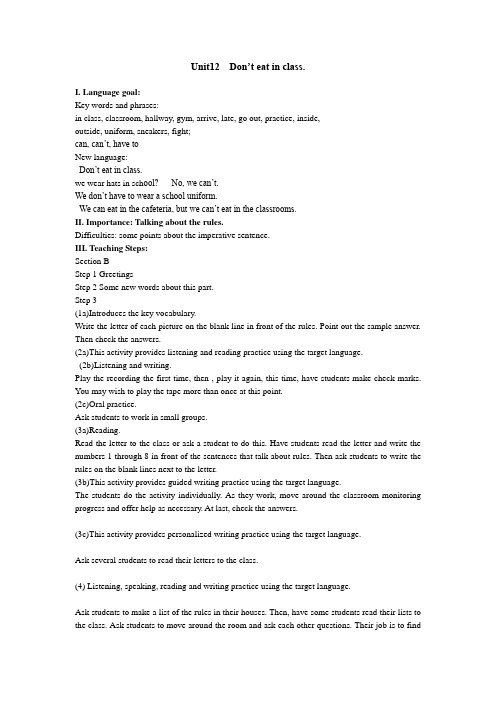
Unit12 Don’t eat in class.I. Language goal:Key words and phrases:in class, classroom, hallway, gym, arrive, late, go out, practice, inside,outside, uniform, sneakers, fight;can, can’t, have toNew language:Don’t eat in class.we wear hats in sch ool? No, we can’t.We don’t have to wear a school uniform.We can eat in the cafeteria, but we can’t eat in the classrooms.II. Importance: Talking about the rules.Difficulties: some points about the imperative sentence.III. Teaching Steps:Section BStep 1 GreetingsStep 2 Some new words about this part.Step 3(1a)Introduces the key vocabulary.Write the letter of each picture on the blank line in front of the rules. Point out the sample answer. Then check the answers.(2a)This activity provides listening and reading practice using the target language.(2b)Listening and writing.Play the recording the first time, then , play it again, this time, have students make check-marks. You may wish to play the tape more than once at this point.(2c)Oral practice.Ask students to work in small groups.(3a)Reading.Read the letter to the class or ask a student to do this. Have students read the letter and write the numbers 1 through 8 in front of the sentences that talk about rules. Then ask students to write the rules on the blank lines next to the letter.(3b)This activity provides guided writing practice using the target language.The students do the activity individually. As they work, move around the classroom monitoring progress and offer help as necessary. At last, check the answers.(3c)This activity provides personalized writing practice using the target language.Ask several students to read their letters to the class.(4) Listening, speaking, reading and writing practice using the target language.Ask students to make a list of the rules in their houses. Then, have some students read their lists to the class. Ask students to move around the room and ask each other questions. Their job is to findother students who have the same rules.Language points:9.Practice your guitar every day.①本句是一个祈使句,祈使句通常以动词原形开头,用来表示命令,请求或劝告的句子。
让学生遵守的《Unit12Don'teatinclass》教案

本次教学内容是《Unit12 Don't eat in class》,主要教授学生不要在课堂上吃东西。
这对于学生的学习和培养良好的课堂行为习惯具有非常重要的意义。
以下就让我们来详细了解一下本次教学任务和具体的教学实施方案吧。
一、课程目标1.知识目标:1)学会基本的英语语法规则2)掌握有关“在课堂上不可吃东西”这个方面的词汇和表达方式;2.能力目标:1)借助课堂情景来表达自己的观点;2)培养学生良好的课堂行为习惯,提高克服学习难点的能力二、教学准备1.教材:《Unit12 Don't eat in class》;2.教具:教师PPT,多媒体设备;3.课前准备:1)将教师PPT制作好,准备课堂所需的多媒体设备;2)浏览教材,确定教学重点,准备教学课件三、教学流程1.预习导入1)师生互动教师需要带领学生微距获取本节课的学习目标,并引导学生通过分组合作进行讨论和预测本次教学亮点。
2)教师讲解在学生思考过程结束之后,教师可以通过报告的方式对本次教学的具体内容进行讲解。
同时,在讲解的过程中,教师要通过图表、数据和实际例子等方式,加深学生对本次教学内容的理解和认识。
2.学习实践1)讲解在正式讲解本课内容前,教师可以先让学生端庄高兴的欣赏一首轻松愉悦的歌曲,为的内容做好一个准备。
教师将通过图像、实际例子等方式,讲述“在课堂上不可吃东西”这个方面所涉及的基本规律和约束力度。
2)实例分析在讲解过程之后,教师可以介绍一些课堂上的实例,让学生通过详细的阐述和演绎来理解这个问题的重要性及后果。
同时,教师也可以通过问答来刺激学生的思考,并进一步加深学生的理解和认识。
3)思考与讨论在学生理解和掌握了本次教学内容之后,教师向学生提出一些问题,并引导学生针对这些问题进行讨论。
在讨论的过程中,如果学生有困惑或不懂的地方,教师应及时给予解答和指导,并在学生兼容并包的情况下,鼓励学生吸收和消化知识。
3. 课堂作业为了巩固学生的知识记忆力,并鼓励学生在智力和思维方面更好的发挥,教师可以将本节课所讲的一些经典重点作为课堂作业,并计入下次小测中,并加以综合分析。
七年级英语下册 Unit 12 Dont eat in class 学案 人教新目标版
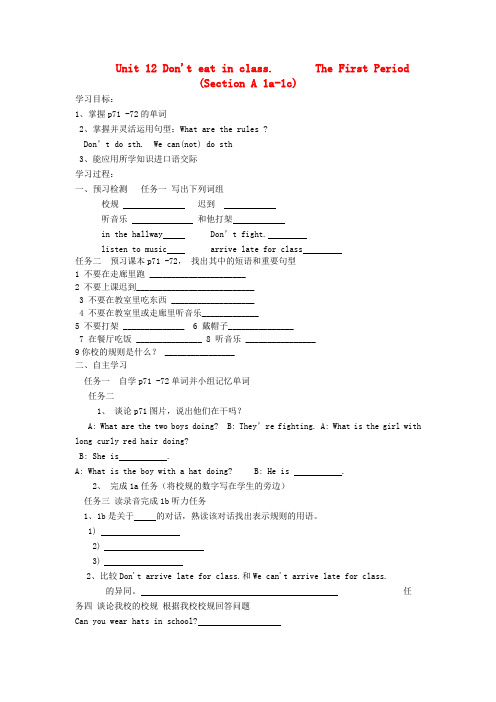
Unit 12 Don't eat in class. The First Period(Section A 1a-1c)学习目标:1、掌握p71 -72的单词2、掌握并灵活运用句型:What are the rules ?Don’t do sth. We can(not) do sth3、能应用所学知识进口语交际学习过程:一、预习检测任务一写出下列词组校规迟到听音乐和他打架in the hallway Don’t fight.listen to music arrive late for class任务二预习课本p71 -72,找出其中的短语和重要句型1 不要在走廊里跑 ______________________2 不要上课迟到___________________________3 不要在教室里吃东西 ___________________4 不要在教室里或走廊里听音乐_____________5 不要打架 ______________6 戴帽子_______________7 在餐厅吃饭 _______________ 8 听音乐 ________________9你校的规则是什么? ________________二、自主学习任务一自学p71 -72单词并小组记忆单词任务二1、谈论p71图片,说出他们在干吗?A: What are the two boys doing? B: They’re fighting. A: What is the girl with long curly red hair doing?B: She is .A: What is the boy with a hat doing? B: He is .2、完成1a任务(将校规的数字写在学生的旁边)任务三读录音完成1b听力任务1、1b是关于的对话,熟读该对话找出表示规则的用语。
1)2)3)2、比较Don't arrive late for class.和We can't arrive late for class.的异同。
unit12 Don’t eat in class(The 2nd period of section A 2a-4grammar-4)教案
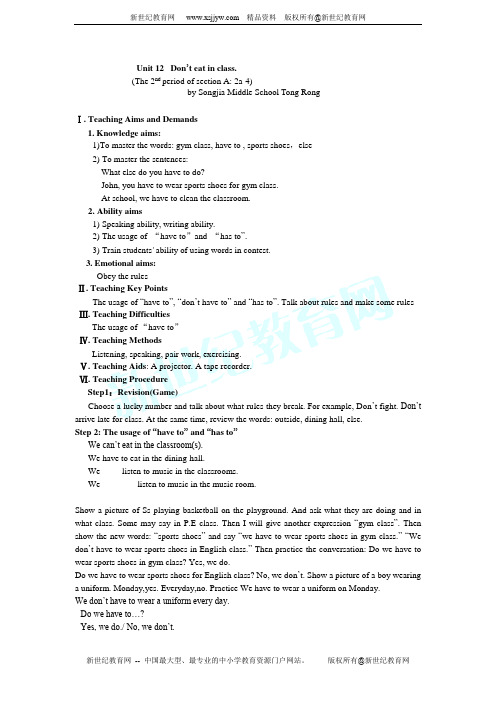
Unit 12 Don’t eat in class.(The 2nd period of section A: 2a-4)----by Songjia Middle School Tong RongⅠ. Teaching Aims and Demands1. Knowledge aims:1)To master the words: gym class, have to , sports shoes,else2) To master the sentences:What else do you have to do?John, you have to wear sports shoes for gym class.At school, we have to clean the classroom.2. Ability aims1) Speaking ability, writing ability.2) The usage of “have to”and “has to”.3) Train students' ability of using words in contest.3. Emotional aims:Obey the rulesⅡ. Teaching Key PointsThe usage of “have to”, “don’t have to” and “has to”. Talk about rules and make some rules Ⅲ. Teaching DifficultiesThe usage of “have to”Ⅳ. Teaching MethodsListening, speaking, pair work, exercising.Ⅴ. Teaching Aids: A projector. A tape recorder.Ⅵ. Teaching ProcedureStep1:Revision(Game)Choose a lucky number and talk about what rules they break. For example, Don’t fight. Don’t arrive late for class. At the same time, review the words: outside, dining hall, else.Step 2: The usage of “have to” and “has to”We can’t eat in the classroom(s).We have to eat in the dining-hall.We ____ listen to music in the classrooms.We ____ ___ listen to music in the music room.Show a picture of Ss playing basketball on the playground. And ask what they are doing and in what class. Some may say in P.E class. Then I will give another expression “gym class”. Then show the new words: “sports shoes” and say “we have to wear sports shoes in gym class.”“We don’t have to wear sports shoes in English class.” Then practice the conversation: Do we have to wear sports shoes in gym class? Yes, we do.Do we have to wear sports shoes for English class? No, we don’t. Show a picture of a boy wearing a uniform. Monday,yes. Everyday,no. Practice We have to wear a uniform on Monday.We don’t have to wear a uniform every day.--Do we have to…?--Yes, we do./ No, we don’t.Step 3: 3a. Fill in the blanks. First, ask the students to read the words and look at the pictures, then fill in the blanks. Ask a few pairs to present their answers.Step 4: 3b. Work in pairs of two and practice the conversation “Do we have to …?” Then ask some students to present their conversations.Step 5: Read the grammar focus and fill in the blanks.Step 6: Game: Make your own rules.Step 7:Challenge yourself.(1)The students _______ ________clean the dining hall on Monday. But they _______ ________ ________clean it every day.(2)Leila _______ _______(have to)_________ _______ _______.But she _______ _______ ______(not have to )__________.Step 8.Back to 3a.John… The students … Mary…Step 9:Exercises.1.____ eat in class. A. Not B. Don’t C Doesn’t D isn’t2. Don’t be late ____ school. A. to B at C. for D in3. My sister ____ to go to school today, because it’s Sunday.A. doesn’t hasB. doesn’t have C don’t have D can’t have4. We can’t listen to music in the classrooms, but we can listen to it o____.5. We don’t have to wear a u________ for the gym class. But we have to wear _______shoes. Step 10: Summarize.Then share a song and some beautiful sentences about rules. When the students listen to the tape for the first time, they need to write down the words they hear. Then sing with the tape.Step 11: Homework:Discuss with your parents and make rules for your family.。
(完整word版)新目标七年级下册Unit12Don’teatinclass.学案
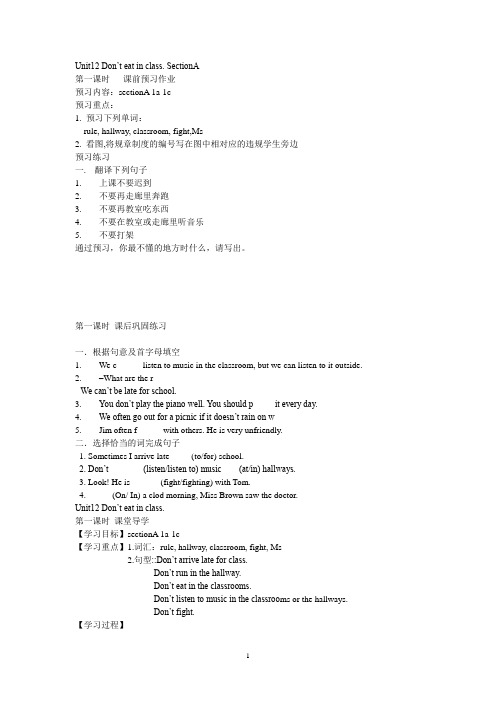
Unit12 Don’t eat in class. SectionA第一课时课前预习作业预习内容:sectionA 1a-1c预习重点:1. 预习下列单词:rule, hallway, classroom, fight,Ms2. 看图,将规章制度的编号写在图中相对应的违规学生旁边预习练习一. 翻译下列句子1. 上课不要迟到2. 不要再走廊里奔跑3. 不要再教室吃东西4. 不要在教室或走廊里听音乐5. 不要打架通过预习,你最不懂的地方时什么,请写出。
第一课时课后巩固练习一.根据句意及首字母填空1. We c listen to music in the classroom, but we can listen to it outside.2. –What are the r--We can’t be late for school.3. You don’t play the piano well. You should p it every day.4. We often go out for a picnic if it doesn’t rain on w5. Jim often f with others. He is very unfriendly.二.选择恰当的词完成句子1. Sometimes I arrive late (to/for) school.2. Don’t (listen/listen to) music (at/in) hallways.3. Look! He is (fight/fighting) with Tom.4. (On/ In) a clod morning, Miss Brown saw the doctor.Unit12 Don’t eat in class.第一课时课堂导学【学习目标】sectionA 1a-1c【学习重点】1.词汇:rule, hallway, classroom, fight, Ms2.句型::Don’t arrive late for class.Don’t run in the hallway.Don’t eat in the classrooms.Don’t listen to music in the classroo ms or the hallways.Don’t fight.【学习过程】一.值日报告二.旧知回顾Task1.小组展示预习作业三.新知呈现Task1.新课导入T: What’s your favorite subject? Do you like music?Now I’d like to enjoy a song with you. (play the tape)Do you like the song? What do you think of the song?Who is your favorite singer?Can you listen to music in the classroom?Can she/he listen to music in the hallways?Why can’t we listen to music in the classroom?S: It is our class rule. (T helps them to say it.)T: So please don’t listen to music in the classroom.Do you know the other class rules?S: Don’t eat in the classrooms.Don’t ……Task2.小组自主合作学习,练习下列句型A: What are the rules?B: Well, we can’t arrive late for class.……Task3.完成1aTask4.听录音,完成1b四.、疑难点拨1. arrive late for= be late for 做某事迟到。
Unit 12 Don’t eat in class. (4课时学案)
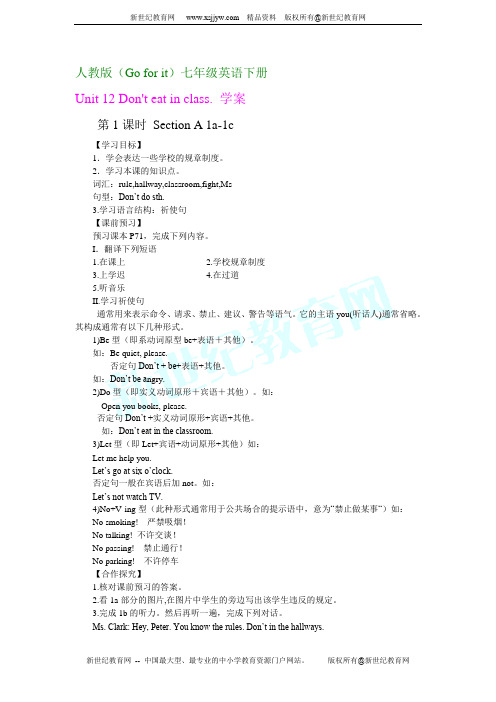
人教版(Go for it)七年级英语下册Unit 12 Don't eat in class. 学案第1课时Section A 1a-1c【学习目标】1.学会表达一些学校的规章制度。
2.学习本课的知识点。
词汇:rule,hallway,classroom,fight,Ms句型:Don’t do sth.3.学习语言结构:祈使句【课前预习】预习课本P71,完成下列内容。
I.翻译下列短语1.在课上__________________2.学校规章制度__________________3.上学迟__________________4.在过道__________________5.听音乐__________________II.学习祈使句通常用来表示命令、请求、禁止、建议、警告等语气。
它的主语you(听话人)通常省略。
其构成通常有以下几种形式。
1)Be型(即系动词原型be+表语+其他)。
如:Be quiet, please.否定句Don’t + be+表语+其他。
如:Don’t be a ngry.2)Do型(即实义动词原形+宾语+其他)。
如:Open you books, please.否定句Don’t +实义动词原形+宾语+其他。
如:Don’t eat in the classroom.3)Let型(即Let+宾语+动词原形+其他)如:Let me help you.Let’s go at six o’clock.否定句一般在宾语后加not。
如:Let’s not watch TV.4)No+V-ing型(此种形式通常用于公共场合的提示语中,意为“禁止做某事“)如:No smoking!严禁吸烟!No talking! 不许交谈!No passing!禁止通行!No parking!不许停车【合作探究】1.核对课前预习的答案。
2.看1a部分的图片,在图片中学生的旁边写出该学生违反的规定。
3.完成1b的听力。
教你如何制定《Unit12Don'teatinclass》教案
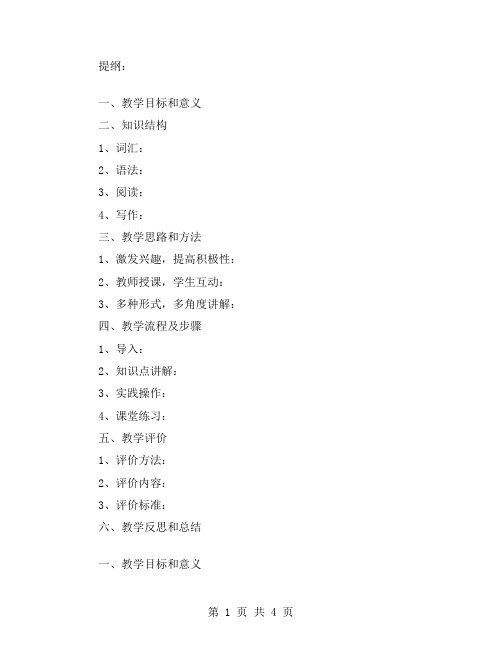
提纲:一、教学目标和意义二、知识结构1、词汇:2、语法:3、阅读:4、写作:三、教学思路和方法1、激发兴趣,提高积极性:2、教师授课,学生互动:3、多种形式,多角度讲解:四、教学流程及步骤1、导入:2、知识点讲解:3、实践操作:4、课堂练习:五、教学评价1、评价方法:2、评价内容:3、评价标准:六、教学反思和总结一、教学目标和意义《Unit12 Don't eat in class》教案旨在帮助学生掌握词汇、语法、阅读及写作等知识点,培养他们良好的学习习惯和品德意识。
通过本教案的学习,学生将会了解到校园安全、文明礼仪等方面的知识,提升他们的文化素养和社会意识。
二、知识结构1、词汇:本单元的词汇主要包括与校园生活相关的用语,如:classroom, backpack, table, chair, pencil, book, etc.2、语法:本单元的语法主要包括名词、形容词和动词的用法。
如:名词:单数和复数形式的用法;形容词:修饰名词的用法;动词:时态和语态的用法。
3、阅读:学生将会阅读一些关于校园安全、文明礼仪等方面的文章,了解和学习相关知识。
4、写作:学生将会有机会进行一些写作训练,提升他们的写作能力和表达水平。
三、教学思路和方法1、激发兴趣,提高积极性:教师可以通过一些有趣的开场白或是图片、视频等方式,吸引学生的注意力,激发他们学习本次课题的兴趣和热情。
2、教师授课,学生互动:教师可以在展示知识点时,采用生动、形象的语言表述,使学生更容易理解和记忆。
同时,教师也可以与学生进行互动,通过反复提问和讲解,加深学生对知识点的理解和记忆。
3、多种形式,多角度讲解:教师可以采用多种形式及角度来进行知识点的讲解,比如说图片、视频、游戏等形式,让学生在多个方面感受和理解知识点。
四、教学流程及步骤1、导入:放映校园安全图片或小视频,引入本单元话题。
2、知识点讲解:依据本单元的四个篇章,逐一讲解单元中涉及的重点词汇、语法、阅读、写作等知识点。
Unit 12 Don’t eat in class(5课时学案)
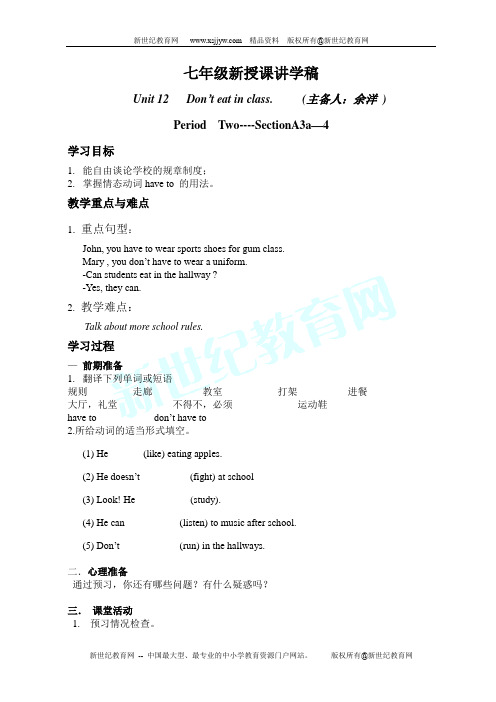
七年级新授课讲学稿Unit 12 Don’t eat in class. (主备人:余洋)Period Two----SectionA3a—4学习目标1.能自由谈论学校的规章制度;2.掌握情态动词have to 的用法。
教学重点与难点1. 重点句型:John, you have to wear sports shoes for gum class.Mary , you don’t have to wear a uniform.-Can students eat in the hallway ?-Yes, they can.2.教学难点:Talk about more school rules.学习过程—前期准备1.翻译下列单词或短语规则_________走廊_________ 教室___________打架__________进餐_________ 大厅,礼堂__________ 不得不,必须____________ 运动鞋_________have to _________ don’t have to _____________2.所给动词的适当形式填空。
(1) He_______(like) eating apples.(2) He doesn’t__________(fight) at school(3) Look! He___________(study).(4) He can___________(listen) to music after school.(5) Don’t____________(run) in the hallways.二.心理准备通过预习,你还有哪些问题?有什么疑惑吗?____________________________________________________________________ 三.课堂活动1. 预习情况检查。
(1) 将课前准备中的情况与同学进行交流,老师点拨;(2) 讨论解决预习中存在的问题。
Unit12《Don’teatinclass》全套教案(6个)(人教新目标初一下)unit124
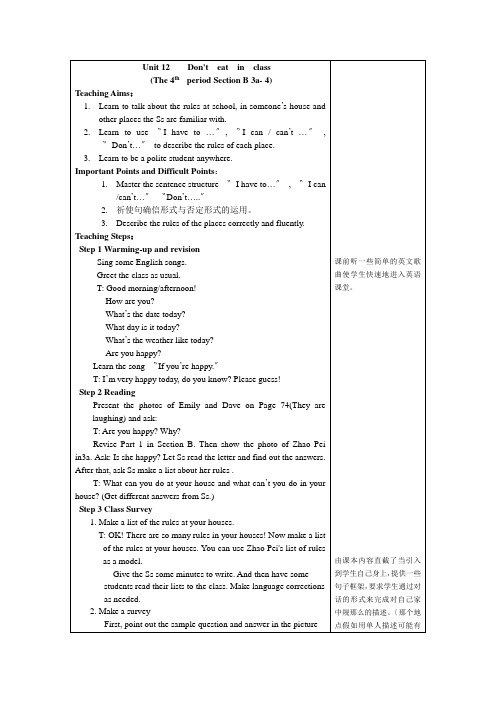
Unit12《Don’teatinclass》全套教案(6个)(人教新目标初一下)unit124
Ask students to move around the classroom and ask eachother questions. Their job is to find other students whohave the same rules.
When student A finds another student with the samerule, student A writes the other student's name nextto that rule on his or her list.
2.Learn to use〝I have to…〞,〝I can / can’t…〞,〝Don’t…〞to describe the rules of each place.
3.Learn to be a polite student anywhere.
Important Points d Difficult Points:
T: You are all good Ss. I hope you can be Ss both at home and at school. Be a good student.
1.Do the exercises in the exercise books.
2.Write a short composition which is about the rules at their houses.
Unit12Don’teatinclass教学设计方案
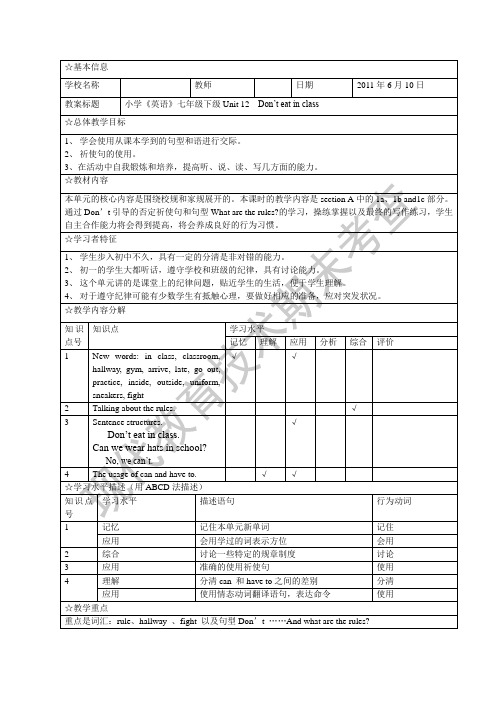
学校名称教师日期2011年6月10日教案标题小学《英语》七年级下级Unit 12 Don’t eat in class☆总体教学目标1、学会使用从课本学到的句型和语进行交际。
2、祈使句的使用。
3、在活动中自我锻炼和培养,提高听、说、读、写几方面的能力。
☆教材内容本单元的核心内容是围绕校规和家规展开的。
本课时的教学内容是section A中的1a、1b and1c部分。
通过Don’t引导的否定祈使句和句型What are the rules?的学习,操练掌握以及最终的写作练习,学生自主合作能力将会得到提高,将会养成良好的行为习惯。
☆学习者特征1、学生步入初中不久,具有一定的分清是非对错的能力。
2、初一的学生大都听话,遵守学校和班级的纪律,具有讨论能力。
3、这个单元讲的是课堂上的纪律问题,贴近学生的生活,便于学生理解。
4、对于遵守纪律可能有少数学生有抵触心理,要做好相应的准备,应对突发状况。
☆教学内容分解知识点号知识点学习水平记忆理解应用分析综合评价1 New words: in class, classroom,hallway, gym, arrive, late, go out,practice, inside, outside, uniform,sneakers, fight√√2 Talking about the rules. √3 Sentence structures.Don’t eat in class.Can we wear hats in school?No, we can’t.√4 The usage of can and have to. √√☆学习水平描述(用ABCD法描述)知识点号学习水平描述语句行为动词1 记忆记住本单元新单词记住应用会用学过的词表示方位会用2 综合讨论一些特定的规章制度讨论3 应用准确的使用祈使句使用4 理解分清can 和have to之间的差别分清应用使用情态动词翻译语句,表达命令使用☆教学重点重点是词汇:rule、hallway 、fight 以及句型Don’t ……And what are the rules?Learn to talk about the school rules.Train students' listening and speaking skills. ☆教学媒体的选择与应用 知识点号 学习水平 媒体类型 媒体内容重点 使用时间 资料来源 教学作用 使用方式 1 记忆 板书 图片 4′ 打印 创设情境 引发动机 边展示 边讲解2 综合 投影 规章制度 5′ 网上下载 提供情境 映入话题 看图—讨论—总结3应用投影语言结构10′教参呈现过程 形成系统理解—讲解—练习☆板书设计1.祈使句是表示命令、叮嘱、号召等的句子,通常省略主语 you.2.句中谓语动词用动词原形。
人教新目标版英语七下《Unit 12 Don’t eat in class》word学案
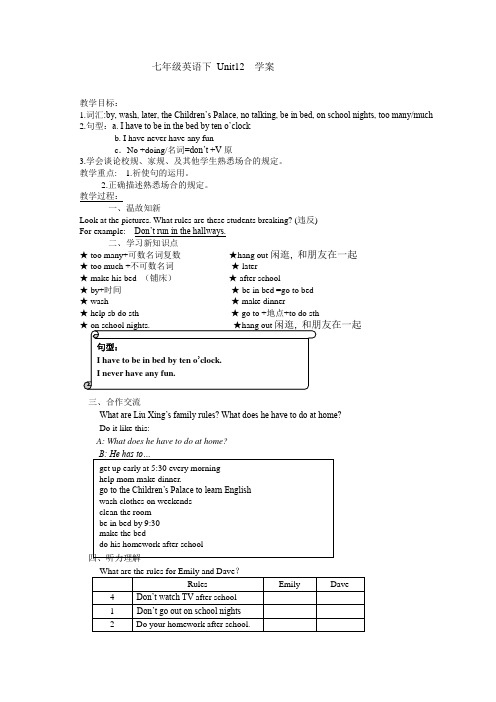
七年级英语下Unit12 学案教学目标:1.词汇:by, wash, later, the Children’s Palace, no talking, be in bed, on school nights, too many/much2.句型:a. I have to be in the bed by ten o’clockb. I have never have any func.No +doing/名词=don’t +V原3.学会谈论校规、家规、及其他学生熟悉场合的规定。
教学重点: 1.祈使句的运用。
2.正确描述熟悉场合的规定。
教学过程:一、一、温故知新Look at the pictures. What rules are these students breaking? (违反)For example: Don’t run in the hallways.二、二、学习新知识点★ too many+可数名词复数★hang out闲逛,和朋友在一起★ too much +不可数名词★ later★ make his bed (铺床)★ after school★ by+时间★ be in bed =go to bed★ wash ★ make dinner★ help sb do sth ★ go to +地点+to do sth三、合作交流What are Liu Xing’s family rules? What does he have to do at home?Do it like this:A: What does he have to do at home?B: He has to…get up early at 5:30 every morninghelp mom make dinner.go to the Children’s Palace to learn Englishwash clothes on weekendsclean the roombe in bed by 9:30make the beddo his homework after school四、听力理解同学们,通过做笔头练习,检查一下自己掌握的情况。
- 1、下载文档前请自行甄别文档内容的完整性,平台不提供额外的编辑、内容补充、找答案等附加服务。
- 2、"仅部分预览"的文档,不可在线预览部分如存在完整性等问题,可反馈申请退款(可完整预览的文档不适用该条件!)。
- 3、如文档侵犯您的权益,请联系客服反馈,我们会尽快为您处理(人工客服工作时间:9:00-18:30)。
第四节学案单元基本知识知识点拨祈使句表示请求或命令的句子叫做祈使句.它通常省略主语(you),根据语气的强弱,在句末用叹号或句号,读时用将调.肯定祈使句用动词原形开头,否定祈使句开头用don’t或never加动词原形,never比don’t的语气更强..肯定祈使句:Do your homework after school.否定祈使句:Don’t eat in class.第十二单元测试题(100分)一、词汇根据词义及受字母填词。
(10分)1. Don’t talk so _____ (loud)! The child is sleeping.2. I think she is _____ (real) a good student.3. I enjoy _____ (listen) to classical music very much.4. There are too many _____ (rule) in my school.5. After dinner, I have to wash the_____ (dish).二、单项选择(20分)( ) 1. — Don’t _____ loudly in the reading room!—Sorry, sir. We will keep quiet.A. talkB. to talkC. talksD. talking( ) 2. —When did they _____ Wuhan?—They _____ Wuhan yesterday afternoon.A. get...got toB. arrive...arrived inC. go...went toD. arrive in...arrived in( ) 3. —Please _____ go out on school nights!— Yes, Miss Wang.A. notB. not toC. don’tD. didn’t( ) 4. — I have to go to the_____ palace to learn the piano.— I do_____.A. child’s...toB. children...alsoC. children’s...eitherD. children’s...too( ) 5. —He is always busy. He never has_____ fun.—I’m _____ to hear that.A. some...gladB. great...niceC. any...sorryD. no...sorry( ) 6. — Don’t eat _____ in class!—Yes, sir.A. somethingB. everythingC. anythingD. nothing( ) 7. —Do I have to clean the classroom?—_____.A. Yes, I do.B. No, I don’t.C. Yes, you do.D. No, you can’t.( ) 8. — What do you usually do _____ night?— I usually stay_____ home and watch TV.A. in...atB. on...atC. at...atD. at...in( ) 9. —_____ should I do if it’s_____?— You should go out and practice your guitar.A. What...sunnyB. What...rainsC. Where...rainingD. How...rain( ) 10. — Can I go out and walk my dog?— _____A. Yes, I can.B. Yes, I will.C. Yes, you can.D. Yes, you don’t.三、完成对话(20分)A: __ (1) __B: I’m drawing a picture.A: __ (2) __B: Here you are.A: Oh! It looks beautiful.B: Thank you.A: __ (3) __B: Yes, I do.A: __ (4) __B: Mr. Wang. He draws very well.A: __ (5) __B: I think you can.A: Would you like to go with me?B: Certainly. Let’s go.四、完型填空(20分)“Where is the university?”“this is a question that many visitors to Cambridge(剑桥) ask. But no one can give them a __1__ answer, for there is no wall to be found __2__ the university. The university is the city. You can find classroom buildings, __3__ ,museums and offices of the university all over the city. And most of its members are the students and __4__ of the thirty-one colleges(学院).”Cambridge was already __5__ town long before the first students and teachers arrived 800 years ago. It grew up by the river granter, and the river was once__6__ the cam.A __7__ was built over the river as early as 875. So the town got its name “Cambridge”. In the fourteenth and fifteenth centuries more and more land was used for college buildings. The town grew much __8__ in the nineteenth century after the opening of the railway in 1845. Cambridge became a __9__ in 1951 and now it has a population of over 100000. Many young students in other contries__10__ to study at Cambridge. Thousands of people from all over the world come to visit the university town. It has become a famous place all around the world.( ) 1. A. true B. clear C. right D. real( ) 2. A. around B. in C. near D. by( ) 3. A. cinemas B. parks C. zoos D. libraries( ) 4. A. parents B. farmers C. workers D. teachers( ) 5. A. interesting B. usual C. developing D. common( ) 6. A. said B. called C. spoken D. talked( ) 7. A. bridge B. building C. station D. house( ) 8. A. smaller B. slower C. faster D. cleaner( ) 9. A. city B. college C. university D. country( ) 10. A. stop B. hate C. hope D. need五、阅读理解(15分)Experts(专家) say that students usually need eight to ten hours’ sleep at night, but most Chinese students do not get enough sleep. Some Chinese parents are usually glad to see their children studying late. They will think their children work very hard. But not all parents are happy about this. Once a mother told us that everymorning the 10 year-old boy put up one finger with his eyes still closed, begging(乞求) for one more minute to sleep. Like thousands of students “early birds” in china, he has to get up before six every morning.A report shows that without a good night’s sleep, students seem to be weaker than they should be. Many students have fallen asleep during class at one time or another. Too much homework is not the only reason(原因). Why students stay up late? Some watch TV or play the computer games late into the night.Experts have ever said that students should develop good study habits(习惯). So some clever students never study late, they are able to work well in class. ( ) 1. the 10-year-old begged for one more minute to sleep because_____.A. he didn’t have enough sleepB. it wasn’t time for him to get upC. he didn’t want to go to schoolD. he wanted his mother to wake him up( ) 2. in this passage “early birds” means persons who_____.A. get up earlyB. get up lateC. sleep lessD. don’t want to sleep( ) 3. from the passage we know if students don’t get enough sleep, they may _____.A. become too weak to sleepB. not work well in classC. not go to bed until lateD. stay outside( ) 4. “stay up late” here means _____.A. study lateB. watch TV lateC. not go to bed until lateD. stay outside( ) 5. according to (根据) the passage, which of the following is right?A. if you want to study better, you must work hard at nightB. sleeping less means working hard.C. some clever students are able to work well in class because they have good study habits.D. students don’t have enough sleep only because they have a lot of homework to do.六、书面表达(15分)根据提示,写一篇短文.提示词: ask, buy something, get to , shop, forget, money, go back, bring, home. _________________________________________________________________________________________________________________________________________________________________________________________________________________________________________________________________________________________________________________________________答案一、1. loudly 2. really 3.listening 4. rules 5. dishes二、1-5 ADCDC 6-10 CCCAC三、1.B 2.E 3.D 4.C 5.A四、1-5 BADDC 6-10 BACAC五、1-5 AABCD六、略。
